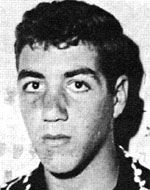Feigenbaum, Levi
Son of Levi and Nitza was born on April 6, 1948, in Kibbutz Beit Keshet, where he studied at the elementary school and high school in his kibbutz. Who was a good-hearted guy who always aspired to help the weak and in need of help, says Yehudit, his classmate: “In our class, an informal division into levels of study was created. Levi belonged to Level B, which bothered him greatly. He aspired to excel in his studies and suffered from the fact that he was always the strong man and not the thinker. “As his grandfather and grandmother attested, he” grew up like a Yaffa, tall, talented, talented musician. “Like every farm boy, And in addition to the various camps in Nazareth, along with a few other members of the kibbutz, because he was a stout and physically fit person who naturally loved sports activities, trips and any challenge that required a very difficult effort. Graduated in his character, critical and highly intellectually alert, Levy was drafted into the IDF in July 1967 and volunteered to serve in the Nahal paramilitary brigade. He graduated cum laude and was instructed to instruct another class in the course. In April 1969 he was sent to officers’ course. After his regular service, Levy volunteered to serve in the regular army and asked to serve as a parachutist in the infantry. He took various professional courses and progressed very quickly on the professional ladder. In 1971 Levy received the position of company commander, and as the commander of the company nearby, Ofer, states: “Levi had excellent data for his position – his physical ability, his will and his physical and mental ability to lead a company.” Very high on the part of his commanders. ” Toward the end of his army service, Levy stood out about his future: Should he return to the kibbutz? Will he be able to realize his desire to study at the Technion? He finally decided to leave his kibbutz and went with his wife – Tzipi, whom he married at the beginning of 1973, to the Ivory Coast. A few weeks later, the couple returned to Israel, and Levi decided to return to the kibbutz. He managed to work for a few days in the cotton field, and the Yom Kippur War brought him back to the battlefield. During the war he took part in the fierce battles in Sinai, in the southern sector. On July 16, 1974, Major Levi died during his service. He was laid to rest in the military section of a cemetery in Beit Keshet. Survived by a wife, mother, stepfather, and three brothers. His family published a booklet in his memory, including stories of his friends from childhood and the period of military service, along with letters to his family and friends.
